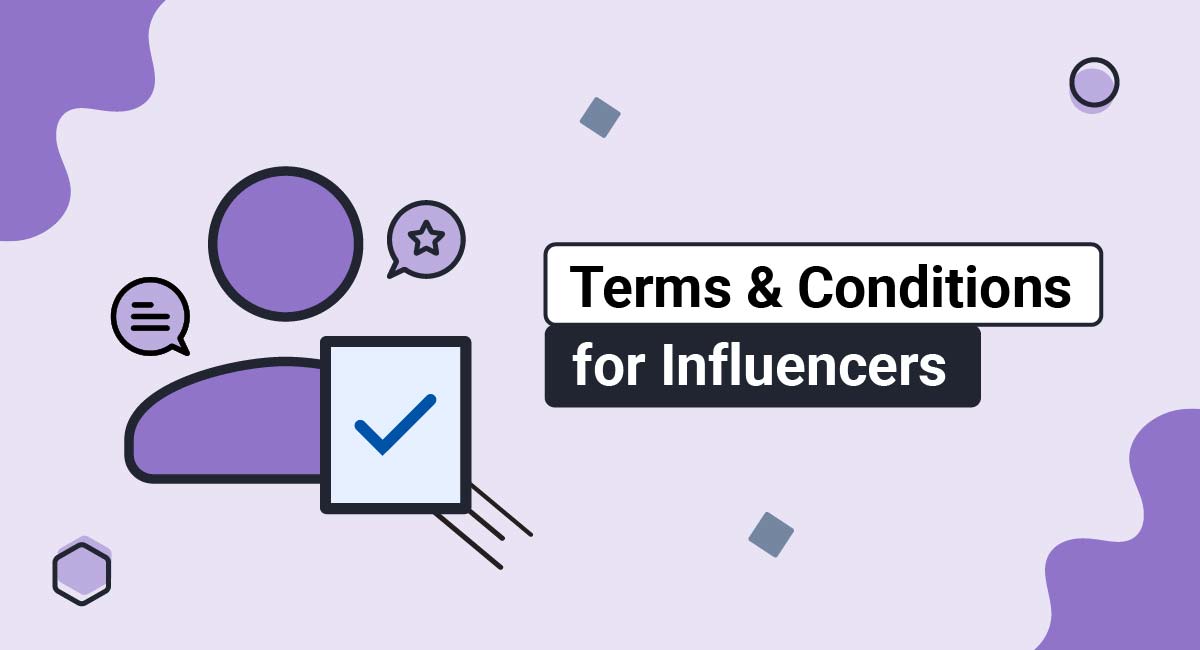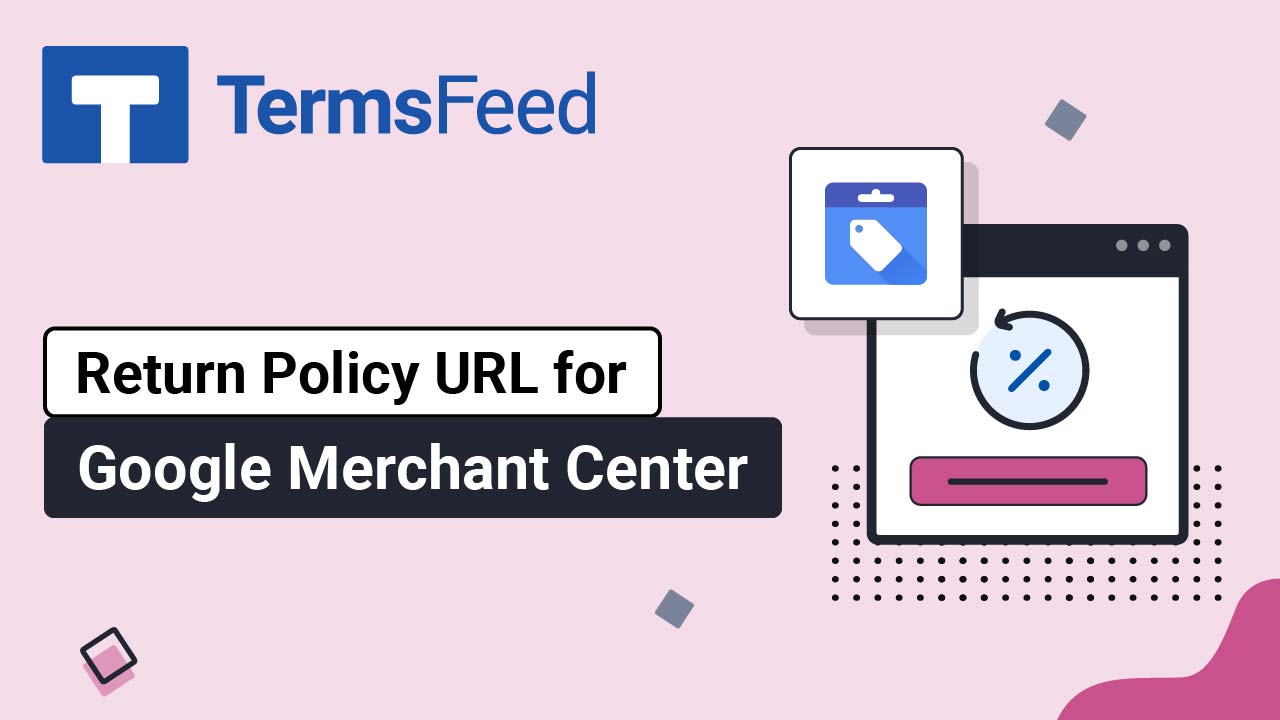When you're an influencer, it's important to have a Terms and Conditions agreement (T&C) in place for your website.
Terms and Conditions (also known as Terms of Use or Terms of Service agreements) are important legal documents that outline the rights and responsibilities of both you and your users. They also establish rules that users must follow when accessing and using your site, while limiting your legal liability and offering important disclaimers.
This article will discuss the importance of Terms and Conditions agreements for influencers, as well as provide guidance for drafting your own T&Cs. Let's get started.
- 1. Why Influencers' Websites Should Have a Terms and Conditions Agreement
- 2. What Protections are Offered to Influencers by a Terms and Conditions Agreement?
- 2.1. Allows You to Terminate Abusive Accounts/Users
- 2.2. Restricts Your Legal Liability
- 2.3. Discourages Abuses of Your Website
- 2.4. Protects Your Intellectual Property
- 3. What Clauses to Include in Terms and Conditions Agreement for Influencers
- 3.1. Your Privacy Policy
- 3.2. Governing Law
- 3.3. Limitation of Liability
- 3.4. Affiliate and Other Disclaimers
- 3.5. Intellectual Property and Copyright
- 3.6. Payment Terms
- 3.7. Termination Clause
- 3.8. Notification of Changes to Your Agreement
- 3.9. Your Contact Information
- 4. Should You Get a Lawyer to Write Your Influencer Terms and Conditions Agreement?
- 5. Getting Consent to Your Influencer Terms and Conditions Agreement
- 6. Summary
Why Influencers' Websites Should Have a Terms and Conditions Agreement
When you see a website with a Terms and Conditions agreement, it's usually because the site is run by a business. This agreement protects the business from any potential legal issues that could arise from users accessing their site.
Personal websites, on the other hand, don't usually have this agreement. This is because there's less risk associated with someone viewing a personal website.
With that said, some influencers have personal websites that usually have a blog component with items they promote and sometimes even have a direct ecommerce component. For instance, they may sell merchandise related to their personal brand.
Some influencers may also allow user content on their websites or post their own copyrighted materials.
In these cases, neglecting to draft and post a Terms and Conditions agreement can be a huge mistake and oversight because you'll miss out on legal protections and enforcement powers that would be available if you had one.
What Protections are Offered to Influencers by a Terms and Conditions Agreement?

Here are just a few ways that a Terms and Conditions agreement can protect your influencer's website:
- Allows you to terminate abusive accounts or users
- Limits your legal liability
- Helps prevent abuses of your site
- Protects your intellectual property
Let's look closer at these protections.
Allows You to Terminate Abusive Accounts/Users
A termination clause allows you to remove problematic users and keep your online community safe and free from abuse.
This helps you keep control of your website and your platform, which can be important for your reputation.
Restricts Your Legal Liability
In case something goes wrong and there is a dispute between you and your website's users, it's crucial to have a clause within your T&C that limits your liability.
At a bare minimum, your liability clause should disclaim losses and damages caused by technical failure, viruses, and any other losses incurred by users or third parties as a result of using your website.
Unfortunately, you can't remove liability for privacy breaches. So, you'll need to keep that in mind. Because of this, it's always advisable to take steps to prevent privacy breaches from occurring in the first place.
Of course, no one can completely eliminate all risk, but by limiting your liability, you can help protect yourself and any business activities you undertake as an influencer.
Discourages Abuses of Your Website
No one likes being spammed. Whether it's a flood of emails, spammy comments on your blog, or spammy user behavior on your website, it's always annoying.
You don't want visitors to leave because of the actions of bad visitors or because some don't feel comfortable sharing their thoughts and ideas.
That's why it's important to have a Terms and Conditions agreement that clearly states what is and is not allowed on your website.
In particular, you'll want to prevent users from engaging in the following:
- Inappropriate commercial activities
- Infecting your system with viruses
- Intellectual property infringement
- Privacy breaches
- Spamming other users
The bottom line here is this: In any online community, it's important to have a clear policy against abusive behavior because it helps to create a safe environment for all users and encourages healthy interaction.
Protects Your Intellectual Property
As an influencer, your website likely contains custom graphics unique to your personal brand which help distinguish it from other sites and other influencers on the internet.
These custom graphics may include logos, content, and even music.
However, while eye-catching layouts, a clever use of custom images, and other unique content can help to make your site more memorable and engaging, they can all also be susceptible to theft by users.
To protect your hard work, it's important to take steps to prevent the theft of your intellectual property.
To do that, it's important to make sure that your Terms and Conditions agreement includes a clause that states that all content on the site belongs to you and that any infringement may result in legal action.
What Clauses to Include in Terms and Conditions Agreement for Influencers

When it comes to writing your own Terms and Conditions for your influencer's website, it's important to first consider your reasons and priorities. Why do you want a Terms and Conditions agreement? What are your goals?
Once you have a good understanding of your reasons, you can start drafting specific clauses.
Keep in mind that your T&Cs should be clear, concise, and easy to understand. They should also be tailored to your particular website and business.
If you're not completely certain where to start, there are many resources available online, such as our Terms and Conditions template that you can use as a starting point.
With that said, some of the most important and commonly seen clauses in a Terms and Conditions agreement are presented below.
Your Privacy Policy
Any website or app that collects personal data from users must have a Privacy Policy in place.
Your influencer website might collect protected personal information such as email addresses if you send out emails about your upcoming campaigns, or financial information if you sell branded merchandise of your own. If you do this, then you must have a Privacy Policy.
Having a Privacy Policy is not only a legal requirement in many countries, but it also helps to build trust with users. This document outlines what type of data is being collected, how it will be used, and what rights users have in terms of their data.
By ensuring that you include a clause in your Terms and Conditions agreement that mentions your Privacy Policy, you can give users the peace of mind that their data is being treated responsibly.
All you need to do is add a short clause noting that you have a Privacy Policy in place, and provide a link to where users can find it.
Here's how Instagram fashion and style influencer Chiara Ferragni writes this clause:

Governing Law
When entering into any kind of legally binding agreement, it is important to specify which jurisdiction's laws will govern the agreement. This is known as a governing law clause, and it helps to prevent disputes from being resolved in a court far from either party's home base.
If an issue arises that is not addressed in the agreement, the governing law clause will determine which laws will be used to interpret the agreement. This is very important for online influencers who reach people all around the world and thus may be open to lawsuits from anywhere in the world.
For example, if you are an influencer like the Swedish YouTuber PewDiePie you'd want your clause on governing law to specify that your T&C is governed by the laws of Sweden. Any disputes that may arise would then be resolved in a Swedish court.
Here's how Chiara Ferragni does this:

Limitation of Liability
A liability clause is an essential part of any Terms and Conditions agreement. This clause protects you from legal action in the event that your app, website, or software causes damages, such as shutdowns, viruses or data loss.
Even if you don't anticipate any problems, it's always best to be prepared. In the event something goes wrong and you're threatened with legal action, this clause can help to limit damages.
Here's an example, from Chiara Ferragni:
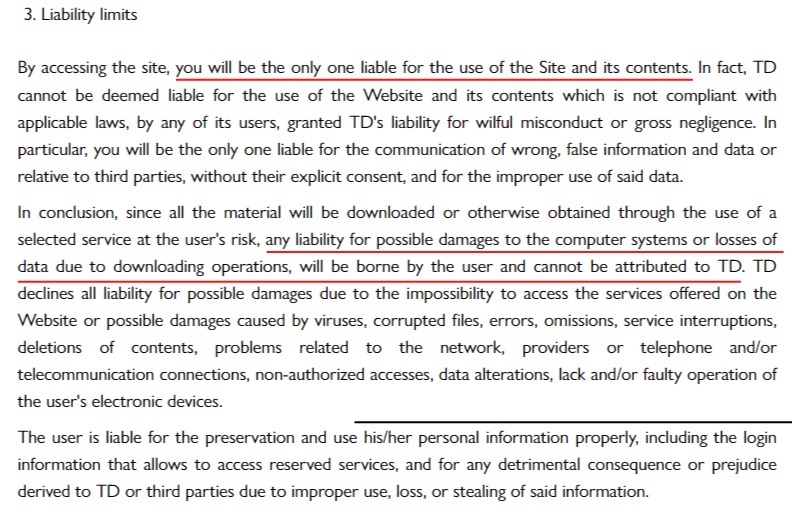
Affiliate and Other Disclaimers
There are a number of important disclaimers that you may want or need to have when you're an influencer. These include:
- An affiliate disclaimer
- Not professional advice disclaimer
- Views expressed disclaimer
- Social media disclaimer
For example, here's an example of health influencer Megan Gilmore's disclaimer about not providing medical advice or services:

Influencers often engage in affiliate marketing. If that's you, then you must disclose your affiliate status.
A disclosure does not necessarily have to be placed alongside every affiliate link but should be placed on every page on which you have included affiliate links. The disclaimer should be clear, conspicuous, and easy to find.
Some common areas to place your affiliate disclaimer are on its own disclaimer page, in your website footer, near affiliate content, and in your Terms and Conditions agreement.
Here's an example from the Relaxed Girl blog of a disclosures section embedded in the site's footer:
An affiliate disclaimer posted at the top of a blog post containing affiliate links might look something like the following:
"I am an affiliate for [COMPANY NAME]. This means that if you purchase products by clicking on a link, I will receive a commission. I only suggest products that I personally use and enjoy."
Here's how Relaxed Girl does this in addition to the footer disclaimer:
Just keep in mind that disclaimers are designed to limit an individual or company's legal liability in different ways, while also informing a user base about important things they should know.
They can be used to explain that someone is not responsible for any damages that may occur, that the user of a product or service agrees to assume all risks, or that a particular product is offered "as is" without any warranty.
Intellectual Property and Copyright
If you've already created your influencer's website, then you know that either you (or someone you paid) put in a lot of time and effort into making it original and unique.
Anyone who wants to use this intellectual property should get permission from you or a license from you first.
If they don't and they use your intellectual property anyway, that's infringement. Infringement is actionable under law, which means you can sue the infringer and potentially get damages awarded to you.
Having a clause that addresses intellectual property rights can help set out your rights here and discourage people from violating your rights.
Here's how Chiara Ferragni does this:
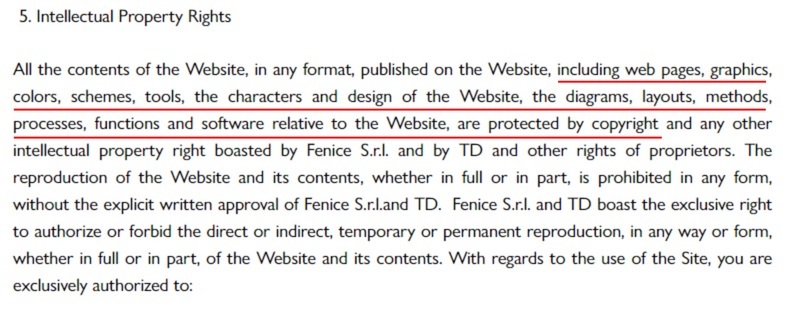
At a minimum, your copyright clause should include the following:
- A statement that copyright infringement is not tolerated
- Information about how to report copyright infringement (including contact information); and
- A statement that anyone who repeatedly infringes on copyright will have their access to your site removed
Additionally, you may want to include a disclaimer in this section that states you're not responsible for user-generated content. This protects you from any legal liability if someone were to post something on your site that infringes on someone else's copyright.
Payment Terms
If you have a section of your influencer's website that acts as an ecommerce store and you sell merchandise, or if your personal website doubles as a freelancing business site, you'll want to include a clause that outlines your payment terms.
By doing so, you can avoid any misunderstanding about how and when payment is due, and other important pieces of information.
For instance, you may require payment upfront, or you may have a different payment schedule for different services. Maybe you have a membership site with subscription levels for different kinds of content.
Whatever the case may be, it's important to be clear about your payment terms from the start.
Here's how lifestyle influencer Janni Olsson Delér writes hers:
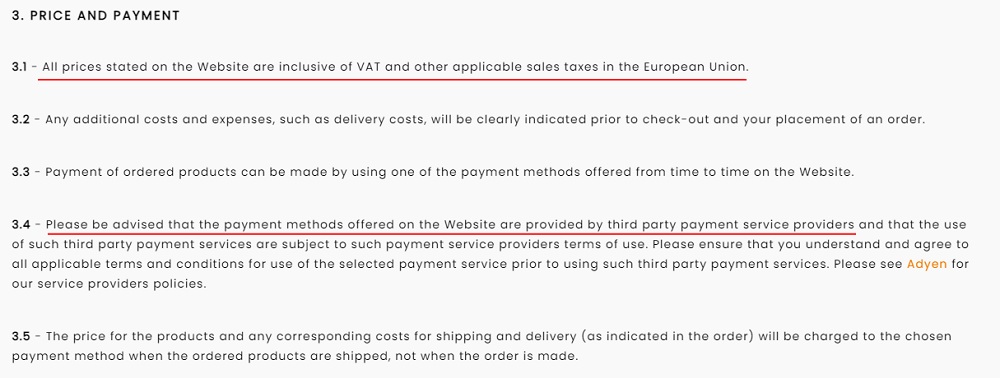
Termination Clause
As briefly discussed previously, the termination clause in your Terms and Conditions agreement is there to protect you. It allows you to terminate accounts that violate your agreement, and allows you to terminate accounts for, essentially, any reason you see fit.
However, a best practice is to stipulate what constitutes a violation of your terms. This way, users are aware of what they need to do to avoid having their accounts terminated.
By clearly specifying the behaviors that will result in termination, you can help create a positive and productive online community.
Additionally, if users are ever unsure about whether or not their behavior violates your terms, they can always contact customer service for clarification. An example from Leonardo DiCaprio is below:
Notification of Changes to Your Agreement
As most are aware, adaptability is key in today's business environment. A notification of changes clause provides you with the authority to make changes as needed and demonstrates that you're transparent about your intentions.
This is vital because it means that you can always keep your agreement up-to-date with any changes in your influencer's status or other business issues.
Here's how Massy Arias does this:

Your Contact Information
You should include your contact information along with a statement at the end of your T&C that invites users to contact you if they have questions and need clarification.
Remember that you can reduce the risk of legal issues later on by ensuring everyone is on the same page from the beginning.
Here's how Massy Arias does this:

While other clauses may be useful in your Terms and Conditions, these are the key ones that could benefit most if not all influencers.
Should You Get a Lawyer to Write Your Influencer Terms and Conditions Agreement?

You probably don't need a lawyer to help you write your Terms and Conditions agreement. Most influencer websites don't have the complexity of a large business's scale and context, so this is something you can do yourself with the help of a Terms and Conditions generator.
Just put in some basic information about your business and the generator will do the rest. You can then edit the agreement to make sure it covers all of the bases we've discussed in this article and anything else you'd like to add.
Getting Consent to Your Influencer Terms and Conditions Agreement

When you create a Terms and Conditions agreement, you're entering into a legal contract with your users. This means that you'll need to get their consent before you can enforce the terms of the contract.
The simplest and most effective way to do this is through clickwrap. This involves having users click a button or tick a checkbox to show they agree to the terms.
Here's an example:
generic-sign-up-account-form-agree-terms-service-checkbox-highlighted.jpg
Generic sign up for account form with agree to Terms of Service checkbox highlighted
Summary
A Terms and Conditions agreement is a contract between you and your influencer website's visitors. It sets out the rules and regulations for using your site, and helps to protect you from liability.
Having a Terms and Conditions agreement on your influencer site will help you:
- Maintain better control over your site
- Build trust with your readers/site visitors
- Limit your legal liability for errors, omissions or copyright issues with your site
- Set out important information that your users will want to know
You can generate your Terms and Conditions agreement with a trusted online generator like ours. Once you have your agreement, you need to get users to accept it. You can ensure this by using the clickwrap method, such as an "I Agree" checkbox.

Comprehensive compliance starts with a Privacy Policy.
Comply with the law with our agreements, policies, and consent banners. Everything is included.
